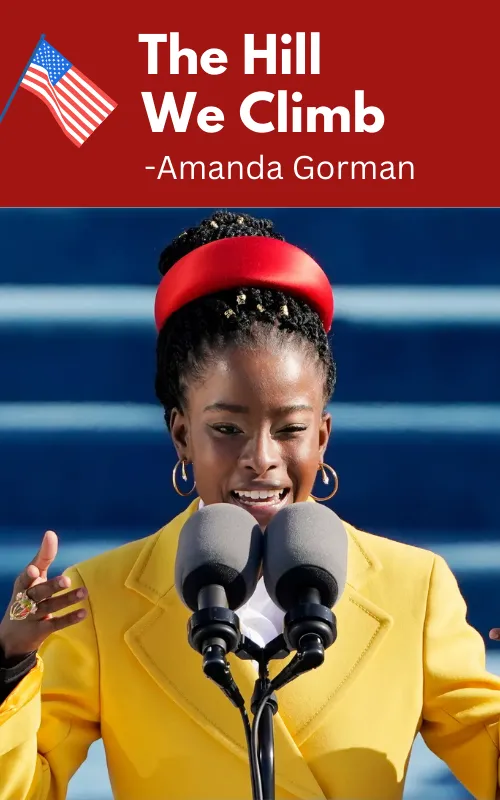About the Poem “The Hill We Climb“
| Poem Title | The Hill We Climb |
| Author | Amanda Gorman |
| Date of publication | January 20, 2021 (Inauguration of Joe Biden) |
| Theme | Unity, hope, resilience, and the American spirit |
| Form | Free verse |
| Occasion | 59th United States presidential inauguration |
| Structure | Divided into six sections |
| Emotion | Hope, optimism, determination |
| Amanda Gorman’s Role | She became the youngest inaugural poet in U.S. history at the age of 22, and her performance garnered widespread acclaim. |
| Inspirational Message | The poem addresses the challenges facing the United States and the need for unity, healing, and progress. |
Themes of The Hill We Climb
The main themes of “The Hill We Climb” by Amanda Gorman are:
- Unity ➤ The poem emphasizes the importance of coming together as a nation.
- Hope ➤ It encourages people to remain optimistic even in challenging times.
- Resilience ➤ It speaks to the idea of facing adversity with strength and determination.
- American Spirit ➤ The poem celebrates the values and aspirations of the United States.
“The Hill We Climb” Poem by Amanda Gorman
When day comes we ask ourselves,
‘where can we find light in this never-ending shade,’
the loss we carry,
a sea we must wade?
We’ve braved the belly of the beast.
We’ve learned that quiet isn’t always peace,
and the norms and notions
of what just is
isn’t always just-ice.
And yet the dawn is ours
before we knew it,
somehow we do it.
Somehow we’ve weathered and witnessed
a nation that isn’t broken
but simply unfinished.
We, the successors of a country and a time
where a skinny Black girl
descended from slaves and raised by a single mother
can dream of becoming president
only to find herself reciting for one.
And yes, we are far from polished,
far from pristine,
but that doesn’t mean we are
striving to form a union that is perfect.
We are striving to forge a union with purpose,
to compose a country committed to all cultures, colors, characters, and
conditions of man.
And so we lift our gazes not to what stands between us
but what stands before us.
We close the divide because we know, to put our future first,
we must first put our differences aside.
We lay down our arms
so we can reach out our arms
to one another.
We seek harm to none and harmony for all.
Let the globe, if nothing else, say this is true:
That even as we grieved, we grew;
that even as we hurt, we hoped;
that even as we tired, we tried;
that we’ll forever be tied together, victorious,
not because we will never again know defeat
but because we will never again sow division.
Scripture tells us to envision
that everyone shall sit under their own vine and fig tree
and no one shall make them afraid.
If we’re to live up to our own time
then victory won’t lie in the blade
but in all the bridges we’ve made.
That is the promise to glade,
the hill we climb
if only we dare it,
because being American is more than a pride we inherit –
it’s the past we step into
and how we repair it.
We’ve seen a force that would shatter our nation
rather than share it
would destroy our country if it meant delaying democracy.
And this effort very nearly succeeded.
But while democracy can be periodically delayed,
it can never be permanently defeated.
In this truth,
in this faith we trust,
for while we have our eyes on the future,
history has its eyes on us.
This is the era of just redemption
we feared at its inception.
We did not feel prepared to be the heirs
of such a terrifying hour
but within it we found the power
to author a new chapter,
to offer hope and laughter to ourselves.
So while once we asked,
‘how could we possibly prevail over catastrophe,’
now we assert,
‘how could catastrophe possibly prevail over us?’
We will not march back to what was
but move to what shall be:
a country that is bruised but whole,
benevolent but bold,
fierce, and free.
We will not be turned around
or interrupted by intimidation
because we know our inaction and inertia
will be the inheritance of the next generation.
Our blunders become their burdens.
But one thing is certain:
If we merge mercy with might,
and might with right,
then love becomes our legacy
and change our children’s birthright.
So let us leave behind a country
better than the one we were left with.
Every breath from my bronze-pounded chest,
we will raise this wounded world into a wondrous one.
We will rise from the gold-limned hills of the west,
we will rise from the windswept northeast
where our forefathers first realized revolution,
we will rise from the lake-rimmed cities of the midwestern states,
we will rise from the sunbaked south.
We will rebuild, reconcile, and recover
in every known nook of our nation and
every corner called our country,
our people diverse and beautiful will emerge,
battered and beautiful.
When day comes we step out of the shade,
aflame and unafraid.
The new dawn blooms as we free it.
For there is always light,
if only we’re brave enough to see it,
if only we’re brave enough to be it.
The Hill We Climb Summary & Analysis
Amanda Gorman’s poem “The Hill We Climb” is a powerful and hopeful call to action written for President Joe Biden’s inauguration in 2021. The poem reflects on recent challenges that the United States has faced, such as the COVID-19 pandemic, the economic crisis, and the political schism that led to the January 6th attack on the Capitol.
However, Gorman also emphasizes the country’s resilience and its ability to overcome adversity. She calls on Americans to work together to build a better future, based on the principles of unity, justice, and equality.
The poem begins with Gorman asking, “When day comes, we ask ourselves /where can we find light in this never-ending shade?”
This question sets the tone for the poem, which acknowledges the darkness and challenges that the country is facing. However, Gorman also offers a message of hope, asserting that “we will not be turned around / or shaken down.”
Gorman then reflects on the events of January 6th, when a mob of Donald Trump supporters stormed the Capitol Building in an attempt to overturn the 2020 presidential election results. This event, she says, is “a force that would shatter our nation rather than share it.” She emphasizes, however, that “while democracy can be periodically delayed, it can never be permanently defeated.”
Gorman then turns her attention to the future of the United States. She calls on Americans to band together to build a better country based on the principles of unity, justice, and equality.
Gorman then turns her attention to the future of the United States. She calls on Americans to work together to build a better country, based on the principles of unity, justice, and equality. She asserts that “we are not broken, but simply unfinished.” She also emphasizes the importance of education and empowerment, stating that “we must raise a generation / that embodies the ideals / we sing of.”
Towards the end of the poem, Gorman references the idea of “the hill we climb.” This hill represents the challenges and obstacles that lie ahead but also symbolizes the opportunity for progress and a better future. She reminds the audience that they have the strength to reach the summit of this hill and that the journey is worth the effort.
FAQs from The Hill We Climb
What is The Hill We Climb poem about?
The Hill We Climb is a poem about hope and resilience in the face of adversity.
What is most important line in The Hill We Climb?
The most important line in “The Hill We Climb” is: For there is always light, if only we’re brave enough to see it.
What are the rhetorical devices in The Hill We Climb?
The poem “The Hill We Climb” uses rhetorical devices such as repetition, parallelism, anaphora, and rhetorical questions to create a sense of rhythm, momentum, and engagement with the reader.
What is the American dream in The Hill We Climb?
The American Dream in “The Hill We Climb” is a future where all Americans are united and equal, and where everyone has the opportunity to succeed.
What is controversial about The Hill We Climb?
The most controversial part of Amanda Gorman’s poem “The Hill We Climb” is the line “We braved the belly of the beast”. Some people have interpreted this line as a reference to the January 6th attack on the Capitol, while others have seen it as a more general reference to the challenges that the United States has faced in recent years.
What influences are in The Hill We Climb?
American history and culture, current events, and the poet’s own experiences are influences in the poem “The Hill We Climb” by Amanda Gorman.









![The Catcher In The Rye Summary, Themes & Characters [by J. D. Salinger] The Catcher In The Rye Summary, Themes & Characters [by J. D. Salinger]](https://atozsummary.com/wp-content/uploads/2023/06/The-Catcher-In-The-Rye-Summary-Themes-Characters-by-J.-D.-Salinger.webp)

